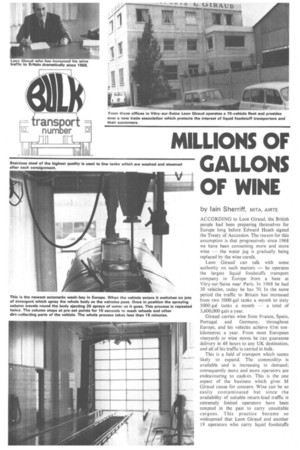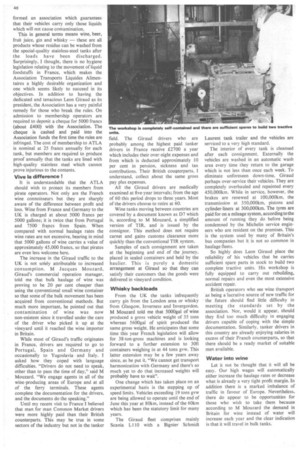MILLIONS OF GALLONS OF WINE
Page 47

Page 48

If you've noticed an error in this article please click here to report it so we can fix it.
by Pain Sherriff, MITA, AIRTE
ACCORDING to Leon Giraud, the British people had been preparing themselves for Europe long before .Edward Heath signed the Treaty of Accession. The reason for this assumption is that progressively since 1968 we have been consuming more and more wine — the water jug is gradually being replaced by the wine carafe.
Leon Giraud can talk with some authority on such matters — he operates the largest liquid foodstuffs transport company in Europe from a base at Vitry-sur-Seine near Paris. in 1968 he had 30 vehicles, today he has 70. In the same period the traffic to Britain has increased from two 5000-gal tanks a month to sixty 5000-gal tanks a month a total of 3,600,000 gals a year.
Giraud carries wine from France, Spain, Portugal and Germany, throughout Europe, and his vehicles achieve 65m tonkilometres a year. From most European vineyards or wine stores he can guarantee delivery in 48 hours to any UK destination, and all of his traffic is carried in bulk.
This is a field of transport which seems likely to expand. The commodity. is available and is increasing in demand; consequently more and more operators are endeavouring to cash-in. This is the one aspect of the business which gives M Giraud cause for concern. Wine can be so easily contaminated but since the availability of suitable return-load traffic is extremely limited operators have been tempted in the past to carry unsuitable cargoes. This practice became so widespread that Leon Giraud and another 19 operators who carry liquid foodstuffs formed an association which guarantees that their vehicles carry only those liquids which will not cause contamination.
This in general terms means wine, beer, fruit juice, gin and whisky — these are all products whose residue can be washed from the special-quality stainless-steel tanks after the loads have been discharged. Surprisingly, I thought, there is no hygiene legislation relating to the movement of liquid foodstuffs in France, which makes the Association Transports Liquides Alimentakes a highly desirable organization and one which seems likely to succeed in its objectives. In addition to having the dedicated and tenacious Leon Giraud as its president, the Association has a very painful remedy for those who break the rules. On admission to membership operators are required to deposit a cheque for 5000 francs (about £400) with the Association. The cheque is cashed and paid into the Association funds the first time the rules are infringed. The cost of membership to ATLA is nominal at 25 francs annually for each tank, but members are required to produce proof annually that the tanks are lined with high-quality stainless steel which cannot prove injurious to the contents.
Vive la difference !
It is understandable that the ATLA should wish to protect its members from pirate operators. Not only are the French wine connoisseurs but they are sharply aware of the difference between profit and loss. Wine from France and Germany to the UK is charged at about 5000 francs per 5000 gallons; it is twice that from Portugal and 7500 francs from Spain. When compared with normal haulage rates the wine rates are not excessive, bearing in mind that 5000 gallons of wine carries a value of approximately 45,000 francs, so that pirates are even less welcome here.
The increase in the Giraud traffic to the UK is not solely attributable to increased consumption. M Jacques Mouzard, Giraud's commercial operation manager, told me that bulk haulage of wine was proving to be 20 per cent cheaper than using the conventional small wine container so that some of the bulk movement has been acquired from conventional methods. But much more important, he pointed out that contamination of wine was now non-existent since it travelled under the care of the driver who picked it up at the vineyard until it reached the wine importer in Britain.
While most of Giraud's traffic originates in France, drivers are required to go to Portugal, Spain and Germany and occasionally to Yugoslavia and Italy. I asked how they coped with language difficulties. "Drivers do not need to speak, other than to pass the time of day," said M Mouzard. "We engage agents in all of the wine-producing areas of Europe and at all of the ferry terminals. These agents complete the documentation for the drivers, and the documents do the speaking."
Until my recent visit to France I believed that man for man Common Market drivers were more highly paid than their British counterparts. This may be true in some sectors of the industry but not in the tanker field. The Giraud drivers who are probably among the highest paid tanker drivers in France receive £2700 a year which includes their over-night expenses and from which is deducted approximately 10 per cent in pension, sickness and tax contributions. Their British counterparts, I understand, collect about the same gross pay plus expenses.
All the Giraud drivers are medically examined at five-year intervals; from the age of 60 this period drops to three years. Most of the drivers choose to retire at 60.
Wine tanks moving between countries are covered by a document known as D7 which is, according to M Mouzard, a simplified version of TIR, and is issued by the consignor. This method does not require carnet and gains customs clearance more quickly than the conventional TIR system.
Samples of each consignment are taken at the beginning and end of the journey, placed in sealed containers and held by the haulier. This is purely a domestic arrangement at Giraud so that they can satisfy their customers that the goods were delivered in vineyard condition.
Whisky backloads
From the UK the tanks infrequently carry gin from the London area or whisky from Glasgow, Inverness and Invergordon. M Mouzard told me that 5000gal of wine produced a gross vehicle weight of 35 tons whereas 5600ga1 of spirit produced the same gross weight. He anticipates that some time this year French legislation will allow for 38-ton-gross machines and is looking forward to a further extension to 30ft containers weighing in at 44 tons gvw. This latter extension may be a few years away since, as he put it, "We cannot get transport harmonization with Germany and there's so much yet to do that increased weights will probably have to wait".
One change which has taken place on an experimental basis is the stepping up of speed limits. Vehicles exceeding 19 tons gvw are being allowed to operate until the end of June this year at 80km, instead of the 60km which has been the statutory limit for many years.
The Giraud fleet comprises mainly Scania L110 with a Bignier Schmidt Laurent tank trailer and the vehicles are serviced to a very high standard.
The interior of every tank is cleansed after each consignment. Externally the vehicles are washed in an automatic wash area every time they return to the garage which is not less than once each week. To eliminate unforeseen down-time, Giraud perhaps over-service their vehicles. They are completely overhauled and repainted every 450,000km. While in service, however, the brakes are renewed at 100,000km, the transmission at 350,000km, pistons and cylinder-liners at 300,000km. The tyres are paid for on a mileage system, according to the amount of running they do before being condemned by the Michelin service engineers who are resident on the premises. This is the system used by many of Britain's bus companies but it is not so common in haulage fleets.
So highly does Leon Giraud place the reliability of his vehicles that he carries sufficient spare parts in stock to build two complete tractive units. His workshop is fully equipped to carry out rebuilding, normal repairs and even the most extensive accident repair.
British operators who see wine transport as being a lucrative source of new traffic for the future should find little difficulty in meeting the standards set by the association. Nor, would it appear, should they find too much difficulty in engaging drivers capable of coping with the simple documentation. Similarly, tanker drivers in this country are already enjoying salaries in excess of their Franch counterparts, so that there should be a ready market of suitable men available.
Water into wine
Let it not be thought that it will all be easy. Our high wages will automatically either increase the haulage rates or decrease what is already a very tight profit margin. In addition there is a marked imbalance of traffic in favour of Europe. Nevertheless, there do appear to be opportunities for those who wish to take them because according to M Mouzard the demand in Britain for wine instead of water vvill increase each year and the clear indication is that it will travel in bulk tanks.














































































































































